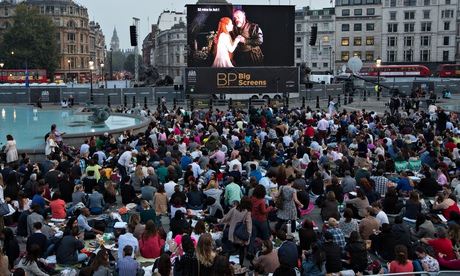The V&A’s new exhibition, the first to be shown in its elegant, recently completed extension by architect Amanda Levete, is devoted to the gloriously extreme world of opera. The show, a collaboration with the Royal Opera House, tells a story that begins with the birth pangs of the artform amid the new sounds of Monteverdi’s Coronation of Poppaea in Venice in 1643, continues with the Handel-obsessed London of the early decades of the 18th century, and passes on to the shock of the premiere of The Marriage of Figaro in 1786, with its dangerous rhetoric of social equality. Eventually – via Nabucco in Milan, Tannhaüser in Paris and Salome in Dresden – it lands in Leningrad with Shostakovich’s Lady Macbeth of Mtsensk.
The exhibition is a reminder that opera, so often derided as elitist, has played an active role in society and politics throughout its life – sometimes as a direct conductor of political ideas, invariably as a mirror of the power structures that produced it. Though Mozart’s Figaro was a toned-down version of the revolutionary play by Beaumarchais on which it was based (said by Georges Danton to have “killed off the nobility”) it was still a radical artwork, with its clever servants outwitting masters on the public stage. Shostakovich’s Lady Macbeth was in the front line of Soviet politics, denounced, in a Pravda editorial of 1936 that almost certainly reflected the personal views of Stalin, as “muddle instead of music” that “tickle[d] the perverted bourgeois taste”.
There are those who would argue that opera in Britain in 2017 lacks the urgency it has carried in the past; that it is an artform for the few, not the many. The current production of La Bohème at the Royal Opera House has top-price tickets for £230. That is by any stretch of the imagination an eye-watering sum. There again, charging the rich as much as they are willing to pay frees up the possibility of £9 tickets at the other end of the scale. Bohème itself – a scandal on its premiere in 1896, with its unflinching vision of poverty among the victims of the 19th-century equivalent of the gig economy – remains, sadly, sharply relevant to our times. And opera in Britain has a vivid life outside the famous houses. Young artists still want to sing it; young composers still want to write it; it still has things to say. There are companies such as Tête-à-Tête, Grimeborn, Birmingham Opera Company and Shadwell Opera that prove it can be staged to appeal to shallower pockets and in very different contexts from those of the grand opera houses.
Above all, the V&A exhibition is a reminder of the cultural links that bind Europe together – links personified, perhaps, by Handel, a German who wrote heart-stopping, wildly popular Italian opera for British audiences. Unconfined by these European roots, it has become a world artform performed from Beijing to Buenos Aires, drawing its stars from across the globe. (A recent production by Turin’s Teatro Regio of La Bohème, for example, had South African soprano Kelebogile Besong entrancing audiences as Musetta at the Edinburgh international festival.)
It may be expensive to stage; it may have an aura of exclusivity. But looked at another way, opera, in all its magnificence, is all at once European, open and global. The V&A show’s final images are of an operatic scene that is still vibrant, its works remade for new audiences, shedding new light on our times.









